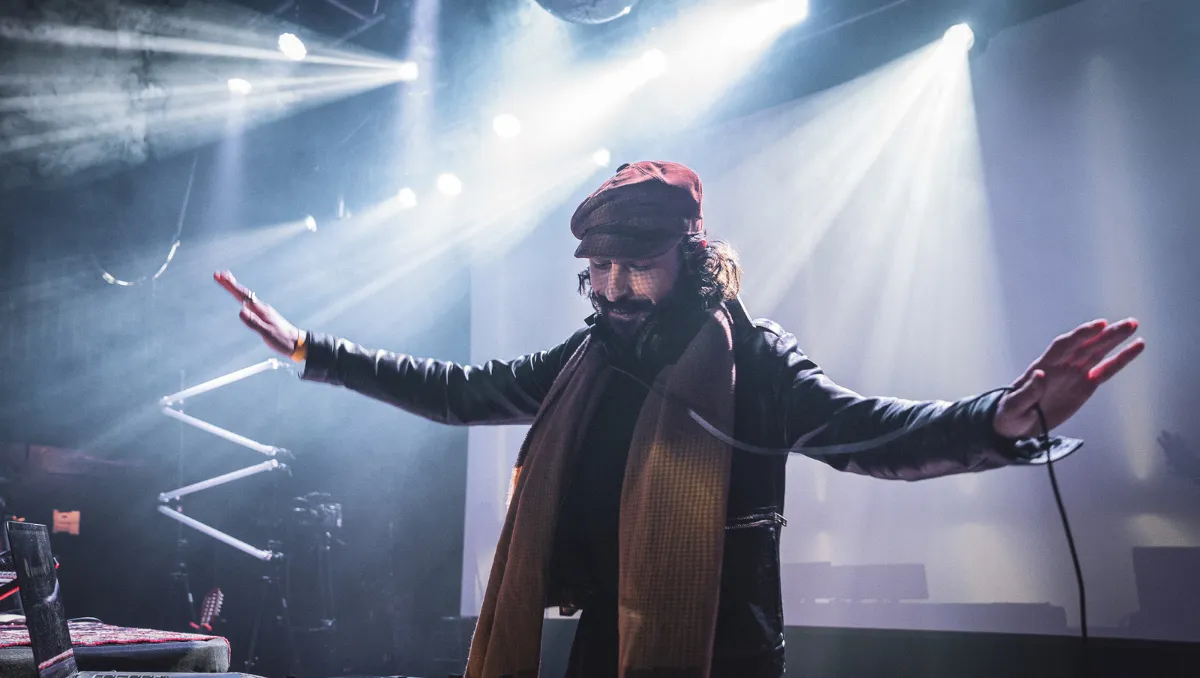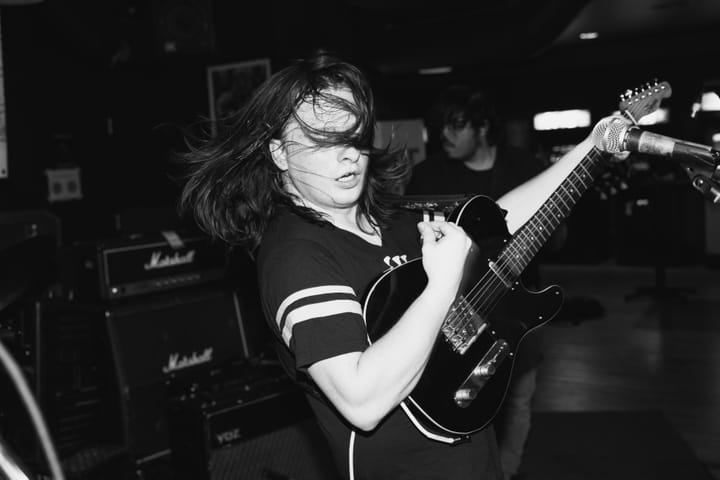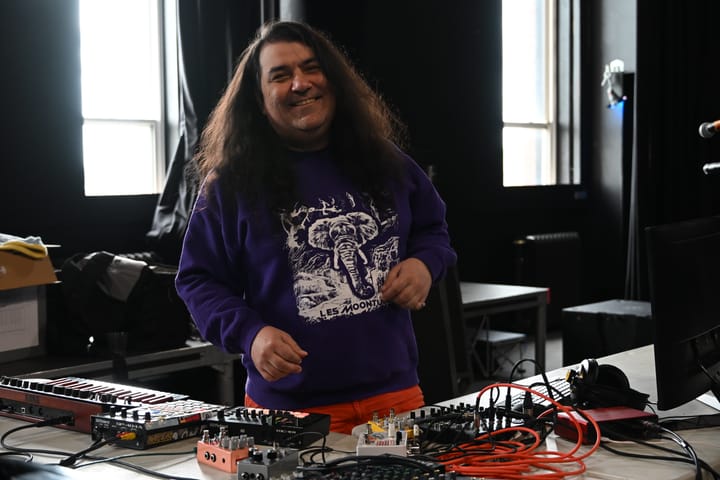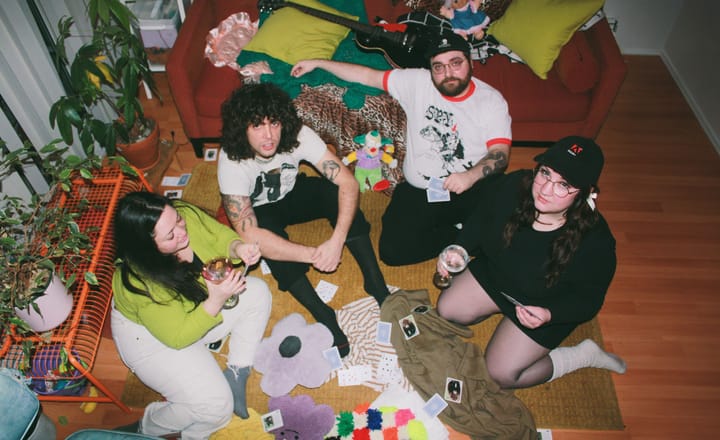
In Conversation with Shaunt Raffi
On Improvisation, Roots and Cultivating Presence
I’m seated across from Armenian artist and curator Shaunt Raffi on the patio of Future Bistro in the Annex, reminiscing about the ’90s cafés of our childhoods.
If you’re an artist in Toronto, chances are you know Shaunt. Alongside his brother Raz, he’s behind some of the city’s most beloved creative hubs: Antikka, the Oud & the Fuzz, and Tapestry in Kensington Market. He’s also a DJ, having opened for artists like German–Syrian duo SHKOON, and the curator of Tapestry Jam: a monthly series where three musicians who’ve never met before come together for a fully improvised, genre-blurring performance.
From his early days of guitar lessons and political activism to providing space for artists to shine and grow today, there is a fierce care and dedication to the way Shaunt navigates the worlds around him, especially when it comes to highlighting Armenian and SWANA (Southwest Asian and North African) culture.
Diving into his practice as both a curator and musician, we discuss community organizing, the state of politics in Toronto’s music scene, and the differences between art and entertainment.
Alexia Bréard Anderson: What’s your first memory related to music?
Shaunt Raffi: Definitely System of a Down. I was into metal and rock growing up, mostly because of my brother. But when System entered the scene, it was a whole different ball game because they were Armenian. I never had seen Armenian representation on such a massive scale, so it was like a hall pass, you know? They definitely played a huge role in my psyche and who I am today, especially regarding music.
Other than that, when I was growing up, my parents were very involved in the Armenian Community Center. My dad, specifically, played a big role in bringing in Armenian musicians to perform and they’d usually stay at our house when they came. I would wake up in the morning to someone practicing guitar in the kitchen. Just being in [those musicians’] presence, watching what they do off stage was pretty pivotal. It takes up a huge part of my childhood memories. When you grow up seeing these massive, super famous stars have breakfast in your house, it brings them down to earth.
You have an incredible variety of creative outlets in your life. Could you share your journey through each, and how they connect with each other?
I’ve always been a huge listener and appreciator of music. At some point though, in late high school/early university, playing music pretty much vanished from my life. I was studying politics and got super involved in the political landscape in Canada — volunteering, serving on different executive committees, interning at Queen’s Park. It was very consuming.
What prompted the switch to politics?
Many reasons. The Armenian Community Centre, and community as a whole, has always been very politically active. We sort of need to be.
When an election rolled around, the centre would endorse certain candidates and we would go out and volunteer for them. I’ve been knocking on doors and putting up lawn signs since I was 12, and I was good at it! Connecting with people came very naturally to me so I progressed quickly which was encouraging. I guess a large part of me felt that getting professionally involved in politics would be a very effective way of serving my community.
After I graduated, I went to Armenia with the purpose of volunteering for a few months and then coming back to politics. I ended up staying there for almost three years. I think something was subconsciously telling me that a career in politics wasn’t for me. I was too deep in it, and it’s pretty hard to stop that machine. At a certain point, I saw a glimpse into my future 50 years from now… who I was, who I was around… And I was like, this ain’t it. So Armenia, at the beginning, was just a way of creating distance.
Funny how the roots call, even when you can’t tell that’s what’s happening.
Totally. It was a beautiful experience that changed me. I was able to rewire a lot of things in my brain about my relationship with myself and my culture.
So much of what I had been convinced of what it meant to be “Armenian” was really broken down. In a diasporan context, being Armenian means attending Armenian school as a kid, showing up to your youth group meetings, showing up to protests, attending community events.
Suddenly, for the first time in my life, I was Armenian when I went grocery shopping. Just walking down the street, hanging out with my friends, going to a bar. I was also working for a nonprofit which focused on sustainable job creation in Armenia’s rural communities. I left the city frequently, visiting and working with the rural communities in the country.
It blew my fucking mind, you know? It blew my mind that suddenly we’re in a room and we’re all Armenian. And I realized, being Armenian is not something I have to do. I’m Armenian whether I like it or not. I needed to feel that, because it made me realize that all of this pressure I was putting on myself to fit in and do all of these things was completely unnecessary.
Why did you return to Toronto?
At this point, I knew I didn’t want to come back to politics. But I also wasn’t necessarily interested in continuing the role I had in Armenia. I was a little lost, and when my brother opened Antikka, our first business, I thought I might as well come help him and see what happens. That’s where the journey of entrepreneurship began. And that space very quickly turned into a space for live music, artists, all of it.
How did running a venue differ from your previous work in politics?
It’s just a different facet of expression that I have a sense of control over. Working in politics, I constantly felt like I was trying to influence the people around me. With music, I was doing exactly what I wanted, with no compromises. No-one was telling me “Oh you need to be careful what you say, how you dress,” or whatever.
Holding space is so much about the process of creation and connection, rather than the end result. It takes so much trust.
Absolutely. [With Tapestry Jam] we’re actualizing a reality. The coexistence of everybody in that room with all of their differences is being actualized. You can hear it! That’s the most special part, for me… It’s real, you don’t have to imagine it. And once you experience something in one sense, you can start to imagine what it’s like in other senses. Because you’ve felt it, and now you know that it’s possible.
And that’s what makes it powerful. You don’t know what that’s going to inspire in people. But I believe in creating and cultivating those realities as much as I possibly can. I think that they will have positive and impactful consequences in our lives.
In what way?
I’m not exactly sure how; that’s not really for me to decide either. It’s not something you can control. And I feel like that’s the difference with a political campaign.
I feel like this approach also takes the pressure off of having to categorize and compare ourselves, whether through identity or otherwise. It shifts us towards trust.
Absolutely. For a long time, I resented my parents’ generation, and the leaders of the Toronto Armenian community for pressuring us like they did. But I’ve been softening and gaining perspective on why they are the way that they are.
So, in the same way that System of a Down was a representation of Armenians on the global music scale, I want to do the best with what I have access to, you know? If it inspires one kid from the community to step out of these roles they feel pressured to fit into, mission accomplished.
What role has entrepreneurship played in your sense of self?
I think entrepreneurship, in general, made me feel like my perspective, stories, and taste had value.
I remember the first few years of Antikka were wild! My brother and I had no fucking idea what we were doing. We were pulling the curtain back on Toronto’s music scene and it made me realize that even if it was difficult, I had put it on a pedestal, and made myself feel like I didn’t belong there.
Antikka opened almost ten years ago at Queen and Ossington, which was a cool, hip neighbourhood. I started meeting the business owners who were building that culture that was so highly regarded and again, it brought it down to earth for me.
In a good or bad way?
To put it frankly, the majority of the people running those businesses at that time were white, and oftentimes appropriating cultures like mine in order to be and feel cool. Not everyone, but while I was trying to fit into their world, it made me realize I have culture. I don’t need to appropriate. It made me feel a lot more rooted in who I am, and feel the value of what I have access to as an Armenian.
If I didn’t open up my own business, I don’t think I would have ever been given that access by someone else. I had to sharpen my elbows and make some room. That helped me feel so much more confident and self-assured in who I am.
I would never be able to take the risks that I do today if it wasn’t for that experience.
What other dimensions of Toronto’s music scene have been important to you?
One of the things I’m most grateful for about being a part of the scene is that it’s changed what used to be a very traditionalist mindset. I had fallen into the camp of “if it’s old, it’s good and if it’s new, it’s bad”
Being involved in the scene, I met a lot of people, came across a lot of curators and spaces and people who were doing and curating things very differently than I was, and with a very similar intention. It made me curious, and more eager to open up to new stuff.
Any particular highlights?
I would say hip-hop is the first genre of music that I really opened myself up to. I’d been a jazz head for years, and I had no fucking clue that hip-hop is jazz! All this music that I “didn’t like” has sampled the music I was listening to. When I started digging into that world and uncovering what artists like J Dilla, Digable Planets, De La Soul, and A Tribe Called Quest had done musically, my mind was fucking blown. And if it wasn’t for certain people that I met in Toronto’s music scene, I don’t know if I would have come across it this way. I’m very grateful.
The city truly has such a huge variety of musical and cultural pockets.
Yes! Places like BSMT 254 and Drom Taberna, events like the Listening Room, collectives like Chai & Jam, everything that Uma Nota Culture does, the Geary Art Crawl, the Music Gallery… It’s so inspiring.
That being said, there are things that frustrate me. I don’t know if what I’m about to say is exclusive to Toronto or not, but there is (and this may have always been the case — I hear artists like Nina Simone talking about this a lot) a huge confusion or lack of awareness between what is art and what is entertainment. I think the two are used interchangeably far too often.
There’s nothing wrong with entertainment, or being an entertainer, but to me that’s not art. For me, what defines art is how much it’s aware of – and reflects – our reality. Creating art that is reflective of the times we live in requires us to cultivate presence. Right? We need to be present in order to feel the frequency, the vibration that we live in, in order to reflect it in our work. If we’re not doing that, the work will fall flat.
It’s becoming increasingly difficult to cultivate spaces where coming together is not to forget, but it’s to acknowledge reality.
Why do you think this is?
How do you, as an artist or curator, convince people to pay money and come to an event where you are consciously making them uncomfortable? Who wants that, right? It’s like, dude, I don’t even know how I’m gonna pay rent next week, why are you doing this?
Whether we like it or not, these realities are not something we can hide from. By cultivating space where we acknowledge them collectively, the power in seeing that we’re not alone in our feelings is what’s going to provide comfort.
I think more spaces and curators in the city need to gain awareness and find ways to foster this.
I think a big part of this is continuing to build trust, so we are more open to something new or unknown.
Yes. When I ran The Oud & The Fuzz, I would get calls asking who was playing that night. I remember thinking — if I tell you, do you have any fucking clue? They’re some local cats, they’re great musicians, but chances are you have no idea who they are and that’s okay! Let me do my job! I’ve spent my entire life — especially the last ten years — training and understanding what type of music I feel deserves a platform and space, and I want to share that with people.
It’s like when you go to a museum. You don’t call and ask what paintings they have. You go because the museum has done the work to curate art for that space. They’ve worked hard to understand the value of it, which you may or may not see when you go… but you give it a chance. Music deserves that too.
Is that why you keep Tapestry Jam lineups anonymous?
Yes. Don’t ask, because I’m not telling you. [Laughs] It doesn’t really matter. Just come and experience. Let yourself feel an emotion that’s new or different from what you feel on a daily basis. We need to give ourselves the opportunity to broaden our horizons, and understand that the world’s not gonna collapse if we come face to face with something unknown.
There’s also a comfort in preserving tradition, especially in a city where so many of us are diasporic. It’s like we need that nostalgia to survive.
Absolutely. Nostalgia is such an all-consuming part of the art and music that we consume, but I think we need to be very careful, because nostalgia is an extremely powerful emotion. It can quickly turn into manipulation or control, which can be very dangerous. We need to be wary of how we tap into nostalgia, and what role it plays in our creative process.
There’s definitely a balance to be found between honouring those who have come before us, and building new futures. How can we look to the past in a way that informs what we do, without losing what’s in front of us?
As musicians, what we need to focus on is not replicating sound but replicating intention.
One of the contemporary music scenes that I really look up to, although I’ve never been, is what’s coming out of London, UK. Artists like Shabaka Hutchings, Ezra Collective, Kokoroko, artists like Alpha Mist, Yussef Dayes, Kamaal Williams…There’s a very specific sound coming out of this scene, and what I love about it is that it it is undeniably jazz but it is also undeniably contemporary. There is no part of your mind that questions when it was made, you know? It’s not a recreation.
The first step is understanding why the music we love was created, what compelled the artist to create this music and how it came to exist. Only then, we can take those tools and apply them to our own lives.
Read more

Sentries: Multifaceted Noise Rock

Step Into Little Stone Crow's World

